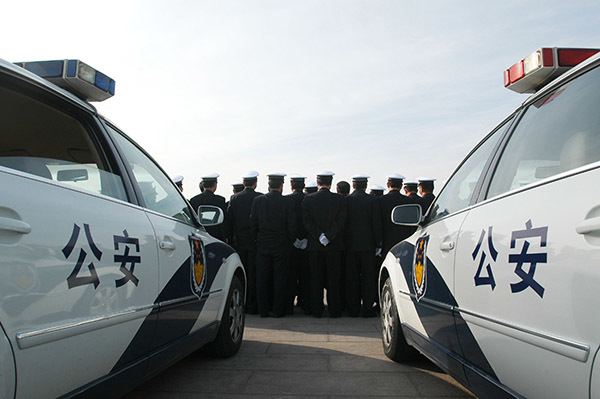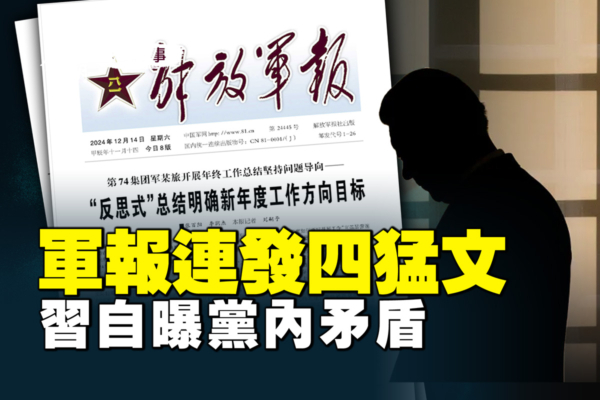Illustration: CCP Police Vehicle (China Photos/Getty Images)
[People News] As global attention turns to the Beidaihe Conference, the Chinese Communist Party's (CCP) Military Report, after a series of articles discussing loyalty and the notions of 'guilt' and 'no guilt' in the Beijing Garrison District, published a documentary report titled 'The Alarm Across Time and Space' on its front page on August 10. This report details a journalist's visit to the former site of the pseudo-supreme court in the Shaanxi-Gansu-Ningxia border area, where the CCP was based before taking power. This article is part of the Military Report's 'Root-Seeking' series. It is evident that, faced with both internal and external challenges, the CCP and the military, unable to find a way forward, are compelled to look back and reflect in hopes of finding answers.
In 'The Alarm Across Time and Space,' the author presents various cases to illustrate how the CCP historically enforced laws and discipline stringently, purging illegal generals from the military.
The first case discusses the CCP senior general Huang Kegong, who, in 1937, attempted to force a marriage and brutally murdered a 16-year-old girl, which garnered significant attention in Yan'an. Under pressure from public opinion and the need to win support while their foundation was still shaky, Huang Kegong was sentenced to death and executed immediately. After detailing this case, the author quotes then-CCP General Secretary Zhang Wentian, who remarked, 'Punishment does not extend to high officials, and courtesy does not extend to common people.'
In reference to the warning that Huang Kegong's case presents to current military personnel, the reporter cites comments from Zhang, the commander of the 77th Group Army: 'Past contributions, personal abilities, and even the needs of the position do not justify arbitrary actions.'
Besides the case of Huang Kegong, the author also references several military cases: Wang Shanhai, who previously served as the director of the military supply department, faced severe punishment for embezzling public funds to buy opium; Feng Luhou, a former deputy commander of the Eighth Route Army, was sentenced to death for fleeing with funds; and the 'combat hero' Xiao Yubi, who embezzled 3,050 yuan, was also sentenced to death...
The central message of the article is that the former leadership of the Chinese Communist Party (CCP) believed in the principle that 'the more anti-corruption, the stronger; the more pure, the more combat-effective' to secure ultimate victory. Today, we should learn from history and achieve similar victories.
In the author's opinion, the logic of the article is flawed and seems to be an attempt at political correctness. In reality, corruption within the CCP army at that time was not significant and cannot be compared to the current level of corruption. Given the lack of widespread corruption, the CCP did not engage in any anti-corruption campaigns; rather, the rectification movement was quite chilling. Thus, there is no inherent link between the combat effectiveness of the People's Liberation Army (PLA) and anti-corruption efforts. The true historical context reveals that the PLA's combat effectiveness was not only inferior to that of the Japanese army but also fell short of the regular Nationalist army. The CCP's usurpation of power can be attributed to various factors, including exploiting the Nationalist government's comprehensive resistance against Japan to grow stronger, deceiving the Americans for support, and using the 'fifth column' to undermine the Nationalist government from within, instigate conflicts, and gather intelligence.
So, what is the intention behind the military newspaper publishing this fabricated article? The author believes that the title of the article and the phrase 'punishment does not extend to the nobility, and courtesy does not extend to the common people' deserve attention.
The title "The Alarm Bell Across Time and Space" suggests that decades ago, the Chinese Communist Party (CCP) was merciless towards high-ranking generals, and today, the CCP is likely to act similarly. The phrase "punishment does not extend to the nobility" conveys the same idea.
Over a decade ago, when Xi Jinping first assumed power, he often indicated that "punishment will indeed extend to the nobility" as he confronted various interest groups and vested interests, including the Jiang faction. By arresting several high-ranking officials, such as Xu Caihou, Ling Jihua, and Su Rong, as well as former Politburo Standing Committee member Zhou Yongkang, he effectively dismantled this longstanding rule. Following this, the spotlight shifted to Jiang faction member Zeng Qinghong.
In November 2015, the Central Commission for Discipline Inspection (CCDI) of the CCP published articles titled "The Style Issues of the Qing Dynasty's 'Naked Official' Prince Qing" and "After Catching Tigers, the Good Days for Ma Yun and Others Are Ahead," reiterating that "regardless of the size of power or the height of position, anyone who violates party discipline and national law will face severe punishment," and that "to catch a thief, first catch the king." The anti-corruption campaign does not recognise any "iron-hat kings," and there will be no "punishment that does not extend to the nobility." At that time, Zeng Qinghong's niece, Wang Xiaoling, who served as the Secretary of the Guangzhou Discipline Inspection Commission, stepped down, and Zeng Qinghong's close associate, former chairman of China Resources Group Song Lin, along with Vice Chairman of the Chinese People's Political Consultative Conference Su Rong, were also removed from their positions, serving as a warning to Zeng Qinghong.
It is unfortunate that in a bid to retain his power and safeguard the CCP, Xi compromised with the Jiang faction before the 19th National Congress of the CCP. The hopes that the people had placed in him to lead the country towards democracy and openness through anti-corruption efforts were abruptly dashed. After the 19th National Congress, Xi embarked on a path of centralisation, amending both the party constitution and the national constitution, and after being re-elected for a third term at the 20th National Congress, his power reached its zenith.
However, human calculations cannot rival those of fate. The various policies implemented during Xi Jinping's leadership, which contradict public sentiment and the will of the heavens, have sparked significant discontent both within the party and among the public. Following the news of Xi's serious illness that surfaced after the Third Plenary Session last July, his power has been swiftly diminished, particularly with the complete loss of military authority. The most notable instance is the downfall of his close ally in the military, Miao Hua. Other close associates, including Vice Chairman of the Military Commission He Weidong, Commander of the Armed Police Wang Chunying, Commander of the Rocket Force Wang Houbin, and Commander of the Eastern Theatre Command Lin Xiangyang, have also been absent for many days, leading to speculation that they too have fallen from power.
Now, the military newspaper has unexpectedly brought up past cases such as that of Huang Kegong, referencing the saying 'punishment does not extend to high officials.' Does this suggest that the missing generals like He Weidong and Miao Hua will not escape punishment? Does it indicate that their alleged crimes will soon be revealed? And what fate awaits Xi, who was responsible for their promotion?
(First published by the People News) △











News magazine bootstrap themes!
I like this themes, fast loading and look profesional
Thank you Carlos!
You're welcome!
Please support me with give positive rating!
Yes Sure!